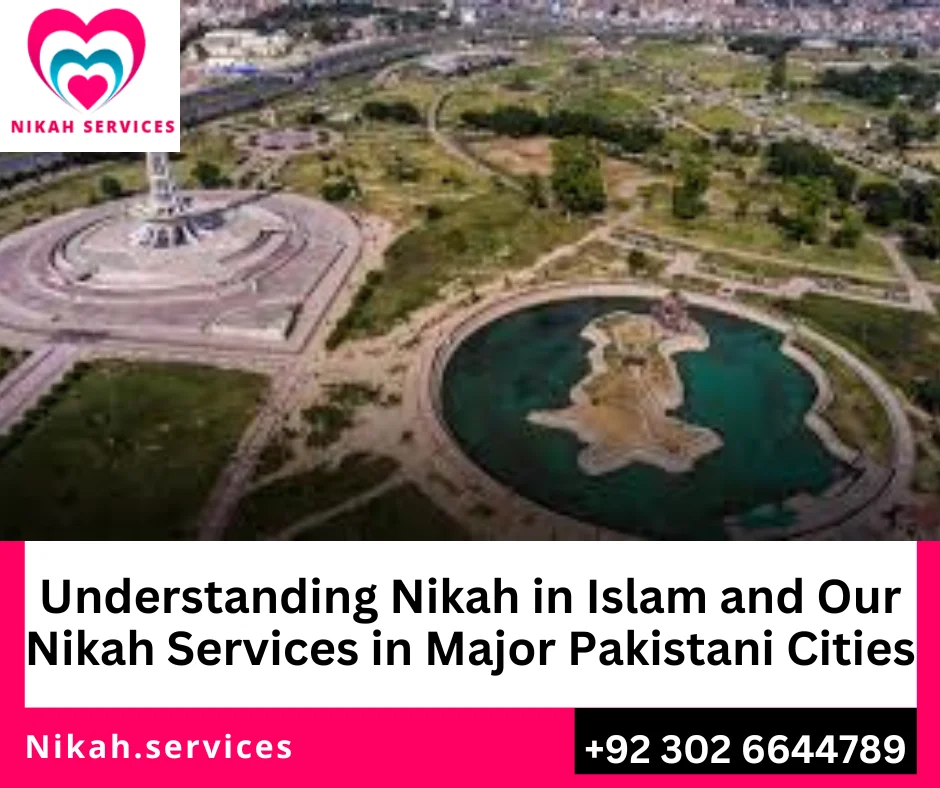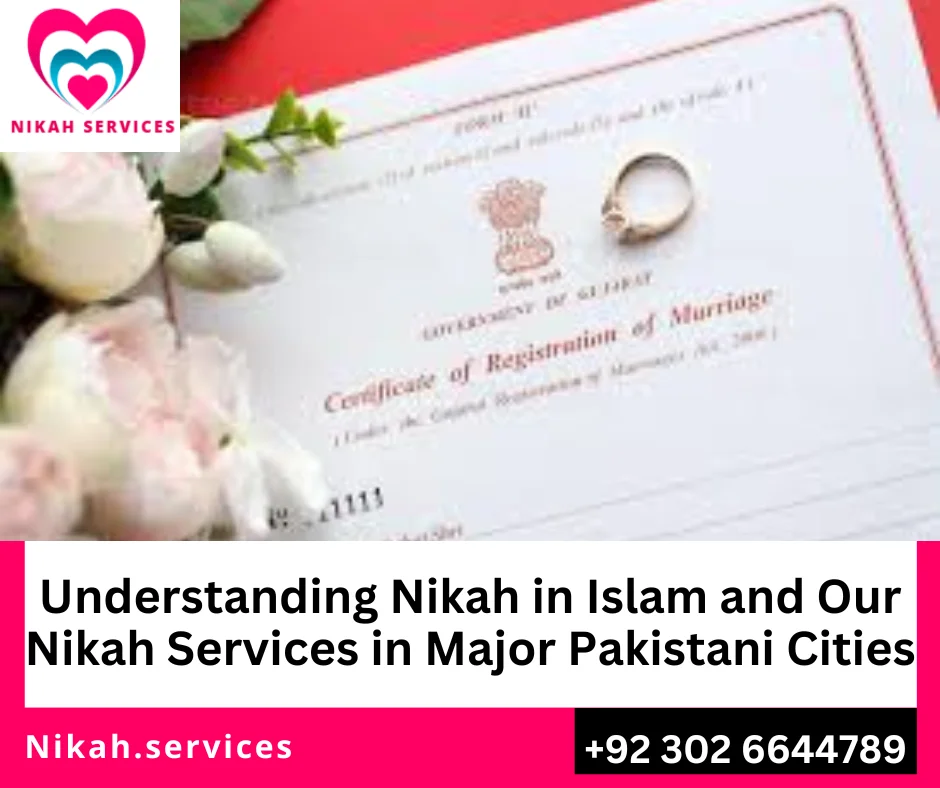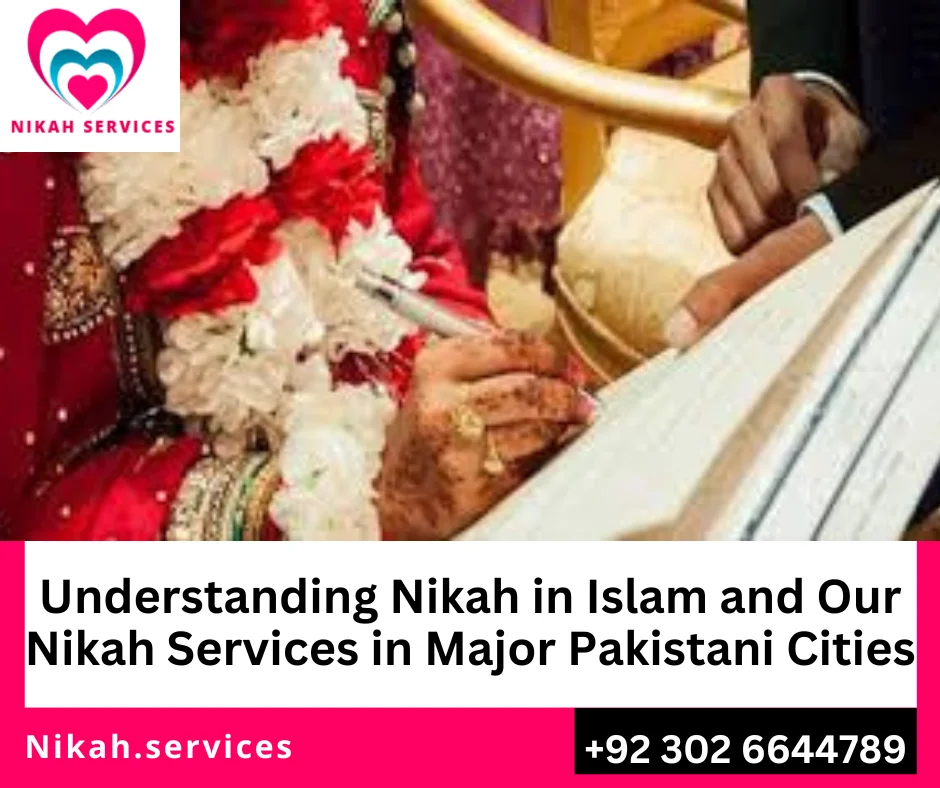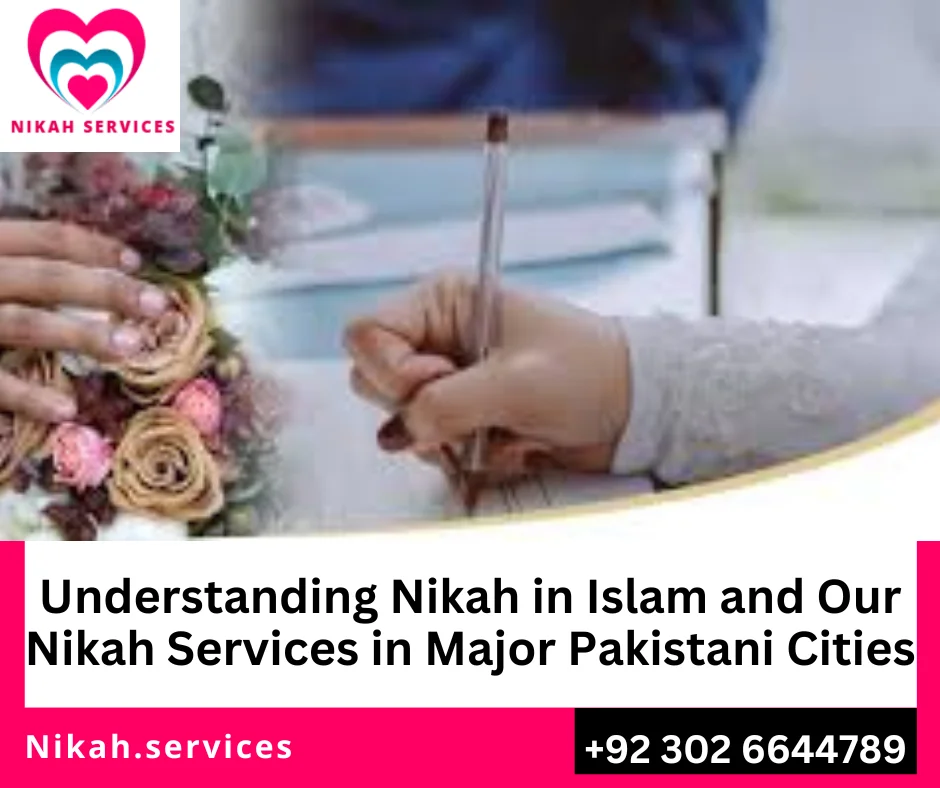Understanding Nikah in Islam and Our Nikah Services in Major Pakistani Cities
What is Nikah?
Nikah is a significant institution in Islam, representing the formal marriage contract between a man and a woman. This sacred bond is not merely a social contract; it encompasses spiritual, legal, and moral dimensions that govern the relationships between spouses. The concept of nikah in Islam highlights the importance of mutual consent, as both partners must willingly agree to enter into this union, free from coercion.
The legal framework surrounding nikah is rooted in Islamic jurisprudence, which provides guidelines to ensure that the marriage is conducted in a manner consistent with Islamic teachings. Key components of this marriage contract include the requirement for witnesses; typically, two male witnesses or one male and two female witnesses are needed to validate the nikah. This reinforces the transparency and integrity of the marriage arrangement.
Additionally, the role of the wali, or guardian, is essential in the context of nikah. The wali acts on behalf of the bride to ensure that her interests are safeguarded throughout the marriage process. This figure, often a male relative, will assist in negotiating the terms of the marriage and provide guidance during the nikah ceremony. The involvement of the wali underscores the communal aspect of marriage in Islam, signifying that it is not just a private agreement but a commitment recognized by society.
In essence, the nikah process aims to foster love and compassion between spouses, establishing a foundation for a fulfilling partnership grounded in mutual respect and shared religious values. It is a celebration of formation and family, emphasizing the importance of compatibility and shared goals. Understanding the significance of nikah in Islam is crucial for anyone considering marriage, as it sets the tone for a lifelong commitment based on Islamic principles.
The Importance of Nikah in Islamic Culture
Nikah in Islam serves as a fundamental institution that not only enshrines the legal bond between partners but also underscores the cultural importance attached to family and community dynamics in Muslim societies. This sacred relationship is deeply rooted in Islamic teachings and is characterized by love, respect, and mutual responsibilities. Through Nikah, individuals formally commit to one another, establishing a foundation that fosters stability and unity within families.
The act of Nikah marks the beginning of a significant social contract that extends beyond the couple, affecting the lives of their families and communities. It is envisioned as a means of promoting family formation, as marriage is seen as a critical pathway to nurturing future generations. By aligning themselves with Islamic principles, couples who engage in Nikah adhere to the moral and ethical standards set forth by their faith, ensuring that their relationship is grounded in spirituality and shared values.

Moreover, Nikah reinforces societal stability by promoting commitment and accountability among partners. In many cultures, including those in Pakistan, Nikah is viewed as essential for a harmonious social structure. It provides a framework for individuals to live together in a manner that is respectful and beneficial to their broader community. The involvement of family and friends in the Nikah ceremony further cements social bonds, highlighting the communal aspect of marriage.
In light of the significance of Nikah, our nikah khawan service in Karachi and other key Pakistani cities—such as our nikah khawan service in Lahore, our nikah khawan service in Islamabad, and our nikah khawan service in Rawalpindi—aims to facilitate this sacred process. We strive to offer professional assistance that honors the values of Nikah while ensuring that the ceremony aligns with cultural and religious expectations, thus making the experience memorable for all involved.

Our Nikah Services Explained
In contemporary society, the significance of the Nikah process in Islam cannot be understated. It is a sacred covenant that involves commitment, mutual respect, and adherence to Islamic principles. Our Nikah khawan service is designed to facilitate this important milestone for couples and their families across major cities in Pakistan. We pride ourselves on offering a professional and authentic approach to conducting Nikah ceremonies, ensuring that each event respects Islamic traditions while also meeting legal requirements.
Our services are available in key cities, including Karachi, Lahore, Islamabad, Rawalpindi, Multan, and Faisalabad, catering to the diverse needs of couples in these regions. Each of our Nikah khawans is not only well-versed in the religious obligations associated with Nikah in Islam but is also equipped to handle all necessary documentation, thus providing peace of mind to families. The professionalism of our team ensures that each ceremony is conducted smoothly, adhering to the expectations and customs of the families involved.
The ease of access to our nikah services means that couples can focus on their special day without the stress of navigating logistical challenges. Our knowledgeable staff guides couples and their families through every step of the process, from initial consultation to the actual ceremony. We understand the importance of authenticity in the marriages we facilitate, ensuring that every Nikah conducted is valid and recognized both religiously and legally.
This commitment to excellence and reliability sets our Nikah khawan service apart in the industry. As we continue to serve communities across Pakistan, we aim to uphold the values of integrity and professionalism, ensuring that every couple experiences a memorable and meaningful Nikah. Our dedication to providing a seamless experience is at the heart of our mission, and we look forward to being part of your journey in accordance with the sacred traditions of Nikah in Islam.
Qualified Nikah Khawans: Our Imams and Registrars
In the context of Nikah in Islam, the role of the Nikah Khawan, also known as an Imam or registrar, is pivotal. Our service, which operates across major cities including Karachi, Lahore, Islamabad, Rawalpindi, Multan, and Faisalabad, prides itself on enlisting only qualified and experienced Nikah Khawans. Each of our Imams is well-versed in the teachings of Islam, ensuring that all ceremonies adhere strictly to Islamic law and teachings.
The qualifications of our Nikah Khawans stem from rigorous educational and practical training. Most of them have completed courses in Islamic jurisprudence that encompass various aspects of marriage and family law. This background enables them to navigate the complexities of Nikah ceremonies, providing couples with clear guidance on their rights and responsibilities as mandated by the Islamic faith.
Moreover, many of our Nikah Khawans proudly hold formal positions as government-deputed officials. This status not only bolsters the legitimacy of the Nikah process but also facilitates the timely registration of the marriage in accordance with local legal requirements. Couples can rest assured that their Nikah will be recognized legally, safeguarding their rights as a married couple under both Islamic and civil law.
In addition to their formal qualifications, our Nikah Khawans display commendable interpersonal skills, making the ceremony not only a legal obligation but a significant spiritual milestone for the couple. They ensure that each Nikah ceremony is conducted with respect and dignity, allowing the couple and their families to feel comfortable and engaged throughout the process. Thus, whether you seek our nikah khawan service in Karachi or our nikah khawan service in Lahore, you can expect professionalism and adherence to both Islamic and societal standards.

Cities We Serve: Karachi, Lahore, Islamabad, Rawalpindi, Multan, and Faisalabad
Understanding the cultural significance of nikah in Islam is essential for those seeking to embark on this sacred journey. Our nikah khawan service in Karachi offers a personalized approach that resonates with the vibrant cultural landscape of the city. Karachi, being the largest city in Pakistan, is a melting pot of traditions, which necessitates a nikah service that is both respectful and attuned to the diverse practices within the community.
In Lahore, our nikah khawan service encapsulates the city’s rich historical and cultural tapestry. Known for its deep-rooted traditions and lively atmosphere, Lahore provides a backdrop that enhances the nikah ceremony. Our team is dedicated to ensuring that the solemnity of the occasion is upheld while also celebrating the local customs that make each ceremony unique.
Furthermore, in Islamabad and Rawalpindi, our nikah khawan service is designed to cater to the needs of clients in these adjacent cities. Islamabad, as the capital, embodies a more modern yet equally traditional approach to nikah, while Rawalpindi offers a blend of both contemporary and classic values. Our knowledgeable staff navigates the nuances of each locale to provide services that are tailored to the specific requirements of the community.
Moving towards Multan and Faisalabad, cities known for their agricultural heritage, our nikah khawan service aims to bridge the gap between tradition and modernity. In Multan, the emphasis on family and community is pivotal, whereas Faisalabad’s emphasis on textile industries shapes its cultural identity. Our team ensures that the nikah services resonate with these local customs, making each ceremony memorable and meaningful.


Step-by-Step Process to Register Your Nikah
Registering your nikah in Islam is an important step that ensures the legal recognition of the marriage ceremony. The process may vary slightly depending on the city; however, the fundamental steps remain consistent across major cities such as Karachi, Lahore, Islamabad, Rawalpindi, Multan, and Faisalabad. Here, we outline a step-by-step process that couples can follow to facilitate their nikah registration.
Initially, couples should begin with an inquiry into the nikah services available in their respective cities. Our nikah khawan service in Karachi, for instance, provides guidance and support throughout the registration process. Couples are encouraged to gather all necessary documents needed for the registration, including valid CNICs, wedding invitation cards, and photographs of the couple. These documents are essential for ensuring a smooth process.
Once the necessary documentation is in order, couples can schedule a meeting with our nikah khawan service in Lahore or any of our services in other cities. The nikah khawan will explain the procedure, fees, and schedules for the ceremony. Engaging with a knowledgeable nikah khawan greatly simplifies the understanding of religious obligations and legal requirements.
The actual nikah ceremony involves the recital of specific Quranic verses and the signing of the nikah nama, a document that formalizes the marriage. It is crucial to have two witnesses during the ceremony, a requirement for the nikah to be valid in Islam. After the ceremony is completed, the nikah khawan will facilitate the legal registration process with the relevant authorities.
Finally, couples will receive a registered copy of the nikah nama, which serves as proof of their union, ensuring they meet both Islamic and legal standards. This thorough process, facilitated by our dedicated nikah khawan services in Islamabad, Rawalpindi, Multan, and Faisalabad, ensures that couples can embark on their married life with confidence and clarity.
Legal Aspects of Nikah in Pakistan
Nikah in Islam is not only a cultural practice but also carries significant legal implications, especially in the context of Pakistani law. The legal framework governing nikah in Pakistan is outlined in several laws, predominantly the Muslim Family Laws Ordinance of 1961. This ordinance mandates certain conditions for the validity of a nikah, emphasizing the importance of consent from both parties. Furthermore, it requires that a marriage contract (nikah nama) is drafted and signed, detailing marital rights and responsibilities.
Under Pakistani law, it is crucial for couples to understand their marital rights, which encompass aspects related to maintenance, inheritance, and the right to divorce. The nikah nama serves as a critical document, ensuring that both husband and wife are aware of their rights and obligations. For instance, the document can include stipulations regarding dowry, which is an essential topic in many marriages. The registration of the nikah is highly encouraged as it provides an official record of the marriage, ensuring that couples have legal protection in case of disputes.
Moreover, the legal implications of nikah extend beyond the wedding ceremony itself. Upon marriage, both partners are entitled to claim certain rights, which include the right to financial support and property ownership. Notably, the registration process plays an essential role in safeguarding these rights and providing legitimacy to the marriage. Without proper registration, spouses may face challenges in asserting their rights, especially during instances such as divorce or inheritance claims.
In major Pakistani cities such as Karachi, Lahore, Islamabad, Rawalpindi, Multan, and Faisalabad, our nikah khawan service is dedicated to helping couples navigate the legal aspects of nikah. We ensure that all necessary documentation is completed accurately, allowing couples to focus on the joyous occasion of their marriage while we handle the legalities associated with nikah in Islam.
Benefits of Choosing Our Nikah Services
Choosing our nikah services offers numerous advantages that cater to both individual needs and cultural traditions integral to the practice of nikah in Islam. One of the primary benefits is the personalized service we provide. Each couple is unique, and our dedicated nikah khawan assesses the specific wishes and requirements of the couple to ensure that the ceremony is tailored to their individual preferences. This customized approach helps alleviate the stress often associated with wedding planning and enables couples to celebrate their union in a manner that resonates deeply with their values.
Another essential aspect of our service is cultural sensitivity. In a diverse country like Pakistan, different communities and cultures have their own customs and rituals related to nikah. Our nikah khawan service in Karachi, Lahore, Islamabad, Rawalpindi, Multan, and Faisalabad is well-versed in the specific practices of each locale. This understanding ensures that the ceremony is respectful and adheres to the cultural expectations of the couple’s families, thereby fostering a harmonious environment during the festivities.
Furthermore, legal assurance is a critical benefit of utilizing our nikah services. Ensuring that the nikah is conducted in compliance with Islamic law and relevant legal regulations is paramount. Our team of experienced nikah khawans is knowledgeable about the necessary documentation and procedures involved, thereby facilitating a smooth journey from the moment of your engagement until the official ceremony. Many couples have praised our services, highlighting how our thorough approach provided them with peace of mind during their big day. The positive feedback we receive serves as a testament to our commitment to excellence in providing nikah services across various cities where we operate.
Frequently Asked Questions About Nikah
Nikah in Islam is a significant religious and legal contract that establishes a marital bond between a man and a woman. It is essential, however, for couples to grasp various aspects of this important ceremony, including its prerequisites and rituals. One common misconception is that a lavish celebration is necessary for the Nikah to be valid. In reality, the essence of Nikah lies in the intention and adherence to the Islamic principles. A simple ceremony can fulfill the requirements as long as the two parties consent and the Nikah is conducted in accordance with Islamic guidelines.
Another frequently asked question pertains to the prerequisites of Nikah. The two major requirements are the consent of both partners and the presence of witnesses, typically two adult Muslims. It is also important to have a Nikah Khawan, who is responsible for officiating the marriage. Our nikah khawan service in Karachi, Lahore, Islamabad, Rawalpindi, Multan, and Faisalabad ensures that this crucial aspect is fulfilled seamlessly, allowing couples to focus on their special day.

Couples often wonder about differences between traditional and modern Nikah practices. Traditional ceremonies usually encompass additional rituals, including the presentation of a gift (mahr) from the groom to the bride and various cultural customs. Conversely, modern practices may simplify these elements but still retain the core spiritual significance inherent in the Nikah contract. Whether opting for a traditional or modern approach, understanding these distinctions is vital for making informed decisions about how to celebrate their union.
Lastly, many couples inquire about the role of family and community in the Nikah process. The family’s involvement can vary; however, it often plays a supportive role in the preparations. Our nikah services offer guidance and assistance to facilitate a smooth and joyous celebration, catering to the unique needs and preferences of the couples involved.

 in Pakistan
in Pakistan